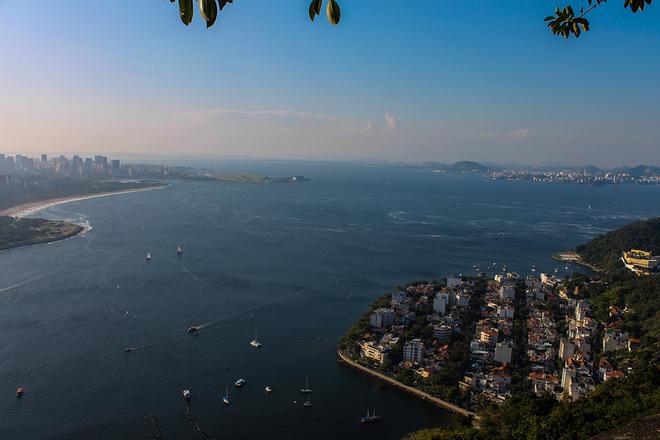ISAF to independently test Rio water quality
by Rob Kothe on 3 Aug 2015

Guanabara Bay - Aquece Rio International Sailing Regatta 2014 ISAF
Congratulations to ISAF President Carlo Croce and new ISAF CEO Peter Sowrey for recognising that the health of Olympic sailors is perhaps more important than the desire of the Brazilian authorities to keep the Olympic coverage cameras in the iconic bay waters of Rio de Janerio.
Croce and Sowrey have been meeting with Rio 2016 Organization Committee members and IOC officials in Kuala Lumpur, Malaysia at the 128th IOC Session and they continued to address concerns, for the health and safety of all athletes who will be competing in the upcoming Aquece Rio, Olympic Test Event and the Rio 2016 Olympic Sailing Competition.
Last Friday Sail-World sought clarification from ISAF on the matter of virus testing of Guanabara sailing course waters, as privately commissioned pathology tests had suggested that levels of disease-causing viruses in some tests measured up to 1.7 million times the level of what would be considered hazardous on a US. beach.
[Sorry, this content could not be displayed]
Now responding to media pressure, the World Health Organization has asked the IOC to analyze virus levels in Rio de Janeiro's Olympic waters, something the Brazilian authorities have up to now denied was necessary.
The new ISAF CEO Peter Sowrey, in a Sail-World interview during in his initial week in Southhampton said he is much more interested in fact based decision making than politics.
So it was not surprising when he said today:
‘Simply we want all the facts for better decision making. We want to have as much information as we can to make smart and safe decisions for all the teams, out on the water.
‘ISAF will independently start testing for viruses.
‘I want to make sure that everyone who goes out in the water is as safe as possible and is given the right guidance and right security.
‘We want to ensure that Rio is a fantastic event for all the right reasons. We are supporting and tracking all activities to improve the water quality and ensure fair sailing. ISAF is committed to Rio 2016 and looks forward to a successful test event in two weeks.
'The fact is we want to make sure the Brazilians are putting energy into cleaning up the bay,
'My job is to make sure something actually happens and it's not just talk, and someone is actually walking the walk.'
He said a 'backup plan' included sailing all the events outside Guanabara Bay in the open Atlantic. ISAF has three courses there, and three inside the bay.
'The health and safety of the competing athletes is paramount and responses have been implemented from concerns raised by both Member National Authorities (MNAs) and sailors from previous events including the 2014 Aquece Rio, the first of two sailing test events that was held in August 2014.
'Sailors were concerned with objects in the water that may interfere with racing during the Olympic Games, and in response the state government launched a tender of up to $11 million USD for 17 ecobarriers to be put in place. These ecobarriers will prevent floating garbage from entering Guanabara Bay and the race areas. The new system of ecobarriers will be complemented by ecoboats that will collect garbage that accumulates around the barriers, with a further step of a monitoring system utilising satellite pictures to support the ecoboats.
'As part of every Olympic Games, there is a focus on legacy. ISAF hopes that the power of the Olympic Games will provide a great legacy as Rio de Janeiro works to improve the state of the bay generally. The IOC monitors the water twice weekly, which will be increased to every other day during the 2015 Aquece Rio test event.
'Other measures taken to increase this legacy will be a new pipeline that will divert sewage from Marina da Gloria, ready by November 2015, well in advance of the Olympic Games, which compliments the other proactive measures around the Guanabara Bay, such as closing landfills, reducing industrial pollution and increasing water treatment works.
'Rio will welcome sailors once again from 13-22 August 2015 for the second Test Event, with racing taking place inside and outside of Guanabara Bay. The Test Event will allow ISAF the opportunity to evaluate the situations and make key decisions in advance of making the final decisions that will govern the main event.'
The results of the water quality monitoring will be significant in the decision making ahead of Rio 2016
While the exact location from which water samples were taken is unknown, nor the tidal times, the AP reported virus levels were very many times greater than levels at which health authorities around the world close waterways citing health concerns so it seems quite possible that Plan B will have to come into play for the Olympic sailing regatta.
That means moving the events offshore. That has major implications for some of the classes. Mat Belcher, the highly regarded 470 World Champion reported after last year’s Rio test event that he had never before sailed a regatta in such a big seaway as he experienced on the offshore Rio courses. That will present a serious problem for the 49ers and the Nacra 17 classes which need much flatter waters than those offshore waters are likely to present.
Additionally the thousands of sailing hours spent by Olympic hopeful’s familarising they with the flat waters of Guanabara Bay will have been for naught.
However in the long term the Duty of Care considerations must come first.
ISAF has in recent years attracted a lot of criticism over its decision making.
We applaud today’s decisions.
We may be seeing a new era in World Sailing, where facts are more important than politics and if that is the case sailing and sailors will win.
If you want to link to this article then please use this URL: www.sail-world.com/137066